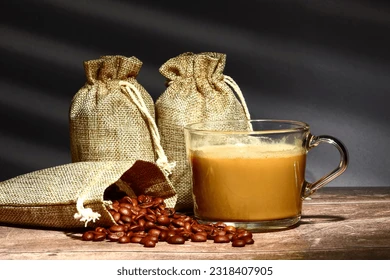Coffee: A Global Journey
Few beverages exist in the world that can garner as much interest, love, and ritual as coffee. From the thronging pavements of Istanbul to the hushed confines of Paris coffee houses, coffee is sufficient by itself to develop into an international language in which very diverse cultures and peoples freely interact and understand one another. No longer does coffee become a simple raise for the morning; it embodies culture, craft, and perhaps even a billion-dollar industry yet to have another transformation. This blog travels through the age, processing, classification, benefits, and cultural phenomena around coffee in determining how this particular one developed into mankind’s most favourite brew over ages.

Origin of Coffee: Story of a Find
The legend stays in a forest in Ethiopia, where lived a goat herder named Kaldi. He himself tried it, felt a subsequent effect, and that his discovery spread to the monastery. Priests experimented with him: they started taking it and apparently used it during their long night vigils to stay awake, and it became popular. He discovered the magic of the shrub after he noticed his goats became frisky with red berries from a certain tree.
In the mid-15th century, coffee had already reached the Arabian Peninsula. The first amplified nation to cultivate coffee in Yemen was soon followed by beans going up all through the Middle East, Persia, and North Africa. This drinking became known as “qahwa,” and coffee houses (qahveh khaneh) turned into venues of intellectual exchange, earning their name as “Schools of the Wise.”
In the 17th century, coffee transported into Europe, where it ignited the flames of social rebellion. It was here that coffeehouses became the political discussion forums leading man.
The Life of Coffee Beans: The Personality Behind Every Brew
Every coffee bean forms the ingredient of coffees but this does not mean that all beans have the same variety. Broadly there are four different types of coffee beans and each of them has different flavors and specificity:
Arabica: These beans are known for their fine and complicated taste and account for around 60 % of the world’s coffee production. Found in high-altitude areas, Arabica is generally demanded because of its intricate taste.
Robusta: This bean has a much stronger and bitter taste with more caffeine content. It is used mostly for espresso blends and also to lift the flavor of the beverage itself. This bean can survive many more pest attacks and lower altitude cropping, which renders it much cheaper.
Liberica: Specific to West Africa; Liberica beans give a unique smoky taste to coffee. They are also larger and much more irregular compared to Arabica or Robusta. Excelsa: With their tart, fruity flavor, these beans are clearly grouped in Libericas. They are recommended for blending because they add flavor complexity to the end.
The Art of Brewing: Method and Technique
Brewing coffee, thus art and science, and preparation. Depending on the brewing method, the influence on the strength and flavor of the final cup becomes all the more significant. Some popular techniques used to brew coffee include:
Espresso Machine: Named after the strongest version of coffee brewed using this equipment: the concentrated form derived from forcing hot water through finely ground coffee under extreme pressure. French Press: This manual method pours coarsely ground coffee into hot water and allows it to steep before pressing the grounds with a metal mesh filter. It produces a really strong, rich brew.
Merits of Coffee
Coffee has some stress-relieving agent-quality properties. There are several health benefits of lower consumption of coffee.
- Cognitive Activation: Coffee has in it the indispensable caffeine chemical. The chemical is a stimulant of the central nervous system; thus, alertness, memory, and concentration are improved.
- Antioxidant Greediness: It loaded into the body such antioxidants like chlorogenic acid, which are concerned with the reduction of oxidative stress and inflammation.
- It Improves Physical Performance: This is because caffeine brings about increased adrenaline level thus coffee is one of the most favourite drinks taken before training by athletes.
- Reduction in the Incidence of Certain Diseases: It is said that consumption of coffee would minimize the possibilities of developing such diseases as Parkinson’s disease, Alzheimer’s disease, and Type 2 diabetes.
- Giving Extra Life: It has associated moderate consumption of coffee with reduced mortality risk due to its use in anti-inflammation and heart health.
Cultural Importance: Just A Drink
Coffee has become part of living from every society in the world where each culture has its special way of approaching the whole affair of coffee:
Italy: The glories of the espresso have now devolved into an entire culture of coffee making in which it has become almost daily-witnessed that people stand at the bar and take an espresso in a hurry.
Ethiopia: There, where coffee started, the traditional coffee ceremony is when most of the people roast, ground, and brew coffee in a jebena (clay pot) and serves it.
Turkey: Turkish coffee that has been prepared and unfiltered served in a cezve adds extra hospitality, thus becoming a base for social events.
Scandinavia: Scandinavians rank among the most prolific connoisseurs of coffee in the world. Fika, Swedish, subtly molds the importance of trying to blend coffee time with some pastry; it is fun and should not necessarily leave you feeling guilty.
United States: The place at which the specialty shops proliferate is in the rising popularity of chains like Starbucks with frappes and chilled brews turned to lifestyle statements through coffee.
Coffee is the Amazing Industry for the Whole World
Coffee is the second most traded commodity after oil, where millions make a living from it, literally from farm to cup. Major producers include Brazil Vietnam, Colombia, Ethiopia. Topics discuss climate change, fair trade, and innovation in sustainable practices such as shade-grown coffee, eco-friendly packaging, etc.
Specialty coffee is everything about quality, traceability, and ethics in sourcing- with the new, free-thinking consumer more aware than ever. It raises craft in coffee and uplifts the lives of farmers and producers.
Future of Coffee: Trends and Innovations
Coffee keeps changing, and these are the trends that are shaping the future of coffee.
Sustainable: From biodegradable pods to farms that are completely carbon neutral, the consumers want all-pervasive openness in everything; most importantly, they want to know how green the products are.
Plant Based Milk: From oat, almond, and soy milk, practically every coffee shop in the world has something on hand for vegans and those who are lactose intolerant.
Specialty Coffee: Third wave heralds a new strain of coffee, characterized by single-origin beans, unique methods of brewing, and responses by artisanal baristas.
Coffee Tech: Traditional meets high-tech in smart coffee makers and mobile apps that will prepare and brew according to your precise preferences.
Functional Coffee: This kind of blend is now trendy among that crowd that using them mainly as health benefit have been endowed with vitamins, adapt gens, or even with CBD.
The End: A Mug of Link
Certainly, coffee is much more than a drink; it goes further than that as a testament to connecting, imaginative, and culture: an everyday ritual, a social get-together, or perhaps the most personally cherished moment of quiet solitude. All that brings a person into shareable encounter yet suffuses a person’s daily existence. In a celebration of this ancient brew, let’s also acknowledge the hands that cultivate, craft, and serve it. Each cup is meant to be savoured by a story worth telling.
https://en.wikipedia.org/wiki/Coffee
https://grocerybyguptas.com/tea-the-ancient-elixir-for-life/
